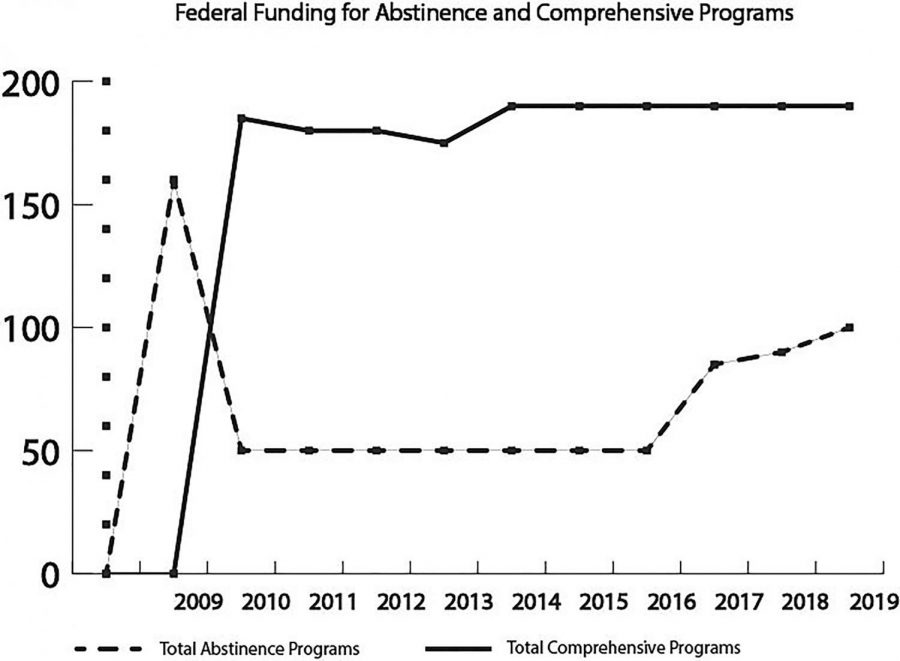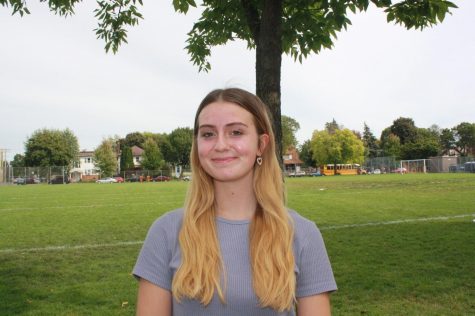Grant funding threatens sex education resources
During the Trump administration the funding for abstinence only programs has gradually increased, going from $50 million when Trump was elected to $100 million in 2019, even though there has been countless amounts of research that proves that a more comprehensive sex education is more effective than an abstinence only program.
January 31, 2020
By June 30th, 2020, the grant from the federal government for sex education will run out and Hennepin County will stop receiving money, meaning Minneapolis Public Schools won’t have the necessary funding for education on sex, sexually transmitted infections (STIs), and pregnancy prevention in the School Based Clinics.
Initially, Hennepin County was given the grant for $17 million under the Obama administration in 2010 to reduce pregnancy rates by educating kids. Since 2007, pregnancy rates of teenagers from ages 15 to 19 declined 51%. However, even with these facts in 2017, the Trump administration decided to cut funding two years early, making the grant end on June 30th, 2018, instead of 2020.
Hearing this news, many recipients of the grant sued the federal government and won the case, pushing the end date of the grant back to 2020. Now that this new decade is upon us, there is only a few months until the grant expires and many people working from the grant, including Alison Moore working in South’s School Based Clinic, don’t know what will happen next.
“Because our grant funding funds not just us, but a whole variety of work both in clinics and in the community, and in classroom and sex education, I think we are all kind of convening what is next for us since all of our work is connected and it all builds on each other and supports each other, ” expressed Moore.
This grant allows the opportunity for students and youth in the community to have the resources proven to help the prevention of teen pregnancies and STIs. according to a study from the University of Washington based on a national survey of 1,719 teens from the ages of 15 to 19. Adolescents who are thoroughly taught about sex education are less likely to become pregnant than adolescents who receive abstinence-only teaching (no sex or waiting until marriage) or no sexual education. The lack of necessary funding for this type of education and resources could have a negative effect on South students.
“I think it will affect the resources that I will have, like at the clinic they have free condoms and testing and birth control and things like that and it will definitely affect a lot of people,” said sophomore Helena Kouamel. “I know a lot of my friends get resources from the clinic and…if we get those [free resources] cut and away from us that would be very bad,” she continued.
This grant is making it possible for students to get their information from well educated professionals and when the grant expires it may put a lot of people who play an important role in youths lives and education out of a job.
“For example, the funding has really helped to support work that I do which is really a one to one clinic-based, evidence-based intervention that really supports healthy decision-making, healthy sexuality and that’s been evidence-based and researched to have shown positive impacts on young people,” said Moore.
The grant also makes it possible to have skilled facilitators from Planned Parenthood in South’s health classes come in and do sex education within the class, helping to train the teachers and make sure that South is using a teen friendly and inclusive curriculum that works.
“If that money goes away, that may mean changes to sex ed and who’s facilitating it, it may mean changes in staffing. It has allowed me to be here full time and I don’t know, that could affect our ability to do that,” explained Moore.
For South’s health classes, this lack of funding is going to make it more difficult to present reliable information and methods of sex education. With Hennepin County being the county in the most need of these resources, funding is necessary.
“Hennepin County has the highest rate of HIV, STDs and teen pregnancies in Minnesota out of all the counties, and if we are not getting this money, then it takes away from having specialists come helping teach the curriculum. Plus, if this funding goes away, we are going to lose the ability to find statistics and the best methods to reach out to teens and it just limits a lot of resources,” explained health teacher Kari Field. The Obama administration made a lot of progressive strides in the direction towards comprehensive sex education and safety, and supported what evidence has shown to work most effectively.
“Each new administration has opinions and views on the kind of work they would want to support the kinds of work they don’t want to support. A lot of this work originated under President Obama’s administration – they created the Office of Adolescent Health and really took the approach of looking at teen health and sexual education from a science-based lense, and really tried to figure out what works, what doesn’t. ‘Let’s do research, let’s collect evidence’… support the things that have shown to make positive impacts,” recalls Moore.
Since the 2016 election, the Trump administration has ignored the facts of successful methods to prevent teen pregnancys and STIs, supporting the belief that abstinence-only education is a better take on sexual education. This differs from the TPPP (Teen Pregnancy Prevention Program) designed to support meticulously researched evidence-based interventions. Trump supports National Abstinence Education Association now known as Ascend. A study done by Mathemetica found that students who are taught abstinence-only method are just as likely to have sex as any other student, but most haven’t received the necessary information to do it safely.
“With this new administration, I would say their approach is very different. They initially cut the funding completely – that happened two years ago. But a bunch of the recipients of the grant sued the federal government and won so that funding got reinstated. That is why we still have funding now through June 30th. I think part of the challenge for us is figuring out if [the Trump administration] is going to create new funding opportunities, and if those funding opportunities support and align with the work we are doing that we know will work because its evidence-based and effective. But we also cannot support approaches that we know don’t work and can actually be harmful,” continued Moore.
Sex education is a critical part of health in general and improves the understanding people have of healthy decision making regarding sex. It also creates an environment that lets teens see sex as more than a joke and helps break down the rape culture that is so common is today’s society.
“Sex ed is important so that we can try and reduce the amount of unwanted pregnancies and STIs and things like that and so people can be safe and educated and get rid of the rape culture that we keep in the air for some reason, and teach everybody to be in a healthy relationship,” said Kouamel.
Kouamel thinks it’s important to “just make it a normal conversation instead of being so ashamed of our bodies and ourselves and us growing so that we are able to talk about these things.”
Kouamel also works on the teen council with Planned Parenthood, which is also being affected by the lack of funding. Planned Parenthood is very connected to the health classes at South, according to Field, it is where the teachers get most of their statistics and information relating to sex education.
“I think sex education is important because it is a critical, important part of health and an important part of all of our health and well-being and sexuality and sex education is critical. Often times, people aren’t getting great sex ed and they’re not getting all the information they need to make the healthiest choices for themselves,” said Moore.
“People aren’t getting accurate information and are looking things up on their own or talking to friends, so being able to get quality, non-judgmental, accurate sex ed information is kind of a part of life skills and things that people need whether they need it now immediately, which some teens do, or maybe need it in the future… it just helps people throughout the rest of their lives, and we want to make sure teens are getting the health information they need, including their sexual health information,” said Moore.
Kouamel concluded. “I think it’s important for kids to have the opportunity and the choice to have sexual education.”








Okuse Marvellous • Apr 6, 2020 at 10:44 am
I so much love watching this movie of sex education, I am a fan of this movie. I enjoy the story mode and the characters that participated in the movie although I can't remember their names. My favorite character is that of the sex therapist, the little boy is my favorite in this movie. I will love to know the release date of the season 3 of it, I can't wait to watch the next season.
https://www.tecteem.com/toxicwap-tv-series-www-toxicwap-com/